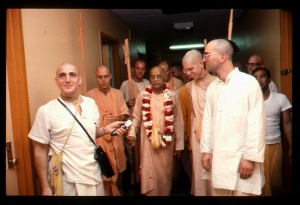CC Antya 7.33: Difference between revisions
m (1 revision(s)) |
(Vanibot #0054 edit - transform synonyms into clickable links, which search similar occurrences) |
||
| (One intermediate revision by one other user not shown) | |||
| Line 1: | Line 1: | ||
{{ | [[Category:Sri Caitanya-caritamrta - Antya-lila Chapter 07|C033]] | ||
<div style="float:left">'''[[Sri Caitanya-caritamrta|Śrī Caitanya-caritāmṛta]] - [[CC Antya|Antya-līlā]] - [[CC Antya 7|Chapter 7: The Meeting of Śrī Caitanya Mahāprabhu and Vallabha Bhaṭṭa]]'''</div> | |||
<div style="float:right">[[File:Go-previous.png|link=CC Antya 7.32|Antya-līlā 7.32]] '''[[CC Antya 7.32|Antya-līlā 7.32]] - [[CC Antya 7.34|Antya-līlā 7.34]]''' [[File:Go-next.png|link=CC Antya 7.34|Antya-līlā 7.34]]</div> | |||
{{CompareVersions|CC|Antya 7.33|CC 1975|CC 1996}} | |||
{{RandomImage}} | |||
==== TEXT 33 ==== | ==== TEXT 33 ==== | ||
<div | <div class="verse"> | ||
trayyā copaniṣadbhiś ca | :trayyā copaniṣadbhiś ca | ||
sāṅkhya-yogaiś ca sātvataiḥ | :sāṅkhya-yogaiś ca sātvataiḥ | ||
upagīyamāna-māhātmyaṁ | :upagīyamāna-māhātmyaṁ | ||
hariṁ sāmanyatātmajam | :hariṁ sāmanyatātmajam | ||
</div> | </div> | ||
| Line 14: | Line 18: | ||
==== SYNONYMS ==== | ==== SYNONYMS ==== | ||
<div | <div class="synonyms"> | ||
''[//vanipedia.org/wiki/Special:VaniSearch?s=trayyā&tab=syno_o&ds=1 trayyā]'' — by followers of the three Vedas who perform great sacrifices like those performed for Indra and other demigods; ''[//vanipedia.org/wiki/Special:VaniSearch?s=ca&tab=syno_o&ds=1 ca]'' — also; ''[//vanipedia.org/wiki/Special:VaniSearch?s=upaniṣadbhiḥ&tab=syno_o&ds=1 upaniṣadbhiḥ]'' — by the followers of the ''Upaniṣads'', the topmost portion of Vedic knowledge; ''[//vanipedia.org/wiki/Special:VaniSearch?s=ca&tab=syno_o&ds=1 ca]'' — also; ''[//vanipedia.org/wiki/Special:VaniSearch?s=sāṅkhya&tab=syno_o&ds=1 sāṅkhya]'' — by the philosophers who analytically study the universe; ''[//vanipedia.org/wiki/Special:VaniSearch?s=yogaiḥ&tab=syno_o&ds=1 yogaiḥ]'' — by mystic ''yogīs''; ''[//vanipedia.org/wiki/Special:VaniSearch?s=ca&tab=syno_o&ds=1 ca]'' — and; ''[//vanipedia.org/wiki/Special:VaniSearch?s=sātvataiḥ&tab=syno_o&ds=1 sātvataiḥ]'' — by devotees who follow the method of worship mentioned in the Pañcarātra and other Vedic literatures; ''[//vanipedia.org/wiki/Special:VaniSearch?s=upagīyamāna&tab=syno_o&ds=1 upagīyamāna]'' — being sung; ''[//vanipedia.org/wiki/Special:VaniSearch?s=māhātmyam&tab=syno_o&ds=1 māhātmyam]'' — whose glories; ''[//vanipedia.org/wiki/Special:VaniSearch?s=harim&tab=syno_o&ds=1 harim]'' — unto the Supreme Personality of Godhead; ''[//vanipedia.org/wiki/Special:VaniSearch?s=sā&tab=syno_o&ds=1 sā]'' — she, mother Yaśodā; ''[//vanipedia.org/wiki/Special:VaniSearch?s=amanyata&tab=syno_o&ds=1 amanyata]'' — considered; ''[//vanipedia.org/wiki/Special:VaniSearch?s=ātma&tab=syno_o&ds=1 ātma]-[//vanipedia.org/wiki/Special:VaniSearch?s=jam&tab=syno_o&ds=1 jam]'' — her own son, born out of her body. | |||
</div> | </div> | ||
| Line 21: | Line 25: | ||
==== TRANSLATION ==== | ==== TRANSLATION ==== | ||
<div | <div class="translation"> | ||
"'When mother Yaśodā saw all the universes within Kṛṣṇa’s mouth, she was astonished for the time being. The Lord is worshiped like Indra and other demigods by the followers of the three Vedas, who offer Him sacrifices. He is worshiped as impersonal Brahman by saintly persons who understand His greatness through studying the Upaniṣads, as the puruṣa by great philosophers who analytically study the universe, as the all-pervading Supersoul by great yogīs, and as the Supreme Personality of Godhead by devotees. Nevertheless, mother Yaśodā considered the Lord her own son.' | |||
</div> | </div> | ||
| Line 28: | Line 32: | ||
==== PURPORT ==== | ==== PURPORT ==== | ||
<div | <div class="purport"> | ||
This verse is from Śrīmad-Bhāgavatam ([[SB 10.8.45]]). | This verse is from [[Srimad-Bhagavatam|''Śrīmad-Bhāgavatam'']] ([[SB 10.8.45]]). | ||
</div> | </div> | ||
__NOTOC__ | |||
<div style="float:right; clear:both;">[[File:Go-previous.png|link=CC Antya 7.32|Antya-līlā 7.32]] '''[[CC Antya 7.32|Antya-līlā 7.32]] - [[CC Antya 7.34|Antya-līlā 7.34]]''' [[File:Go-next.png|link=CC Antya 7.34|Antya-līlā 7.34]]</div> | |||
__NOTOC__ | |||
__NOEDITSECTION__ | |||
Latest revision as of 20:57, 19 February 2024

A.C. Bhaktivedanta Swami Prabhupada
TEXT 33
- trayyā copaniṣadbhiś ca
- sāṅkhya-yogaiś ca sātvataiḥ
- upagīyamāna-māhātmyaṁ
- hariṁ sāmanyatātmajam
SYNONYMS
trayyā — by followers of the three Vedas who perform great sacrifices like those performed for Indra and other demigods; ca — also; upaniṣadbhiḥ — by the followers of the Upaniṣads, the topmost portion of Vedic knowledge; ca — also; sāṅkhya — by the philosophers who analytically study the universe; yogaiḥ — by mystic yogīs; ca — and; sātvataiḥ — by devotees who follow the method of worship mentioned in the Pañcarātra and other Vedic literatures; upagīyamāna — being sung; māhātmyam — whose glories; harim — unto the Supreme Personality of Godhead; sā — she, mother Yaśodā; amanyata — considered; ātma-jam — her own son, born out of her body.
TRANSLATION
"'When mother Yaśodā saw all the universes within Kṛṣṇa’s mouth, she was astonished for the time being. The Lord is worshiped like Indra and other demigods by the followers of the three Vedas, who offer Him sacrifices. He is worshiped as impersonal Brahman by saintly persons who understand His greatness through studying the Upaniṣads, as the puruṣa by great philosophers who analytically study the universe, as the all-pervading Supersoul by great yogīs, and as the Supreme Personality of Godhead by devotees. Nevertheless, mother Yaśodā considered the Lord her own son.'
PURPORT
This verse is from Śrīmad-Bhāgavatam (SB 10.8.45).